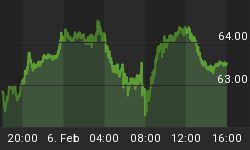Bonds set back (2.95% 10y notes), and stocks rallied (0.6%), on the marginally unimpressive news that the ADP employment indicator was +42K rather than +30K expected and the ISM Non-Manufacturing Composite rose to 54.3 rather than falling to 53.0. That's a pretty slender reed for optimism, but volume was light and this is probably more likely to be modest pre-Employment positioning than anything else.
I was more impressed with the news that China is making its banks "stress test" for a 60% decline in home prices rather than the 30% they had previously demanded. Of course, China is anything but a transparent democracy, so we won't know whether the tests were conducted rationally or whether it means anything at all, ... oh, wait a minute, that's pretty close to the EU test. Forget what I said about transparent democracy!
In the "amusing news" department was this nugget: the NY Fed is looking to put back to the issuers 'ineligible mortgages' they acquired in non-agency RMBS and CDO securities when they rescued AIG and cleaned Bear Stearns up for its shotgun wedding to JP Morgan. As an investor in these securities, the Fed of course has the right to put back loans that weren't eligible for the structures they were embedded in (this is typically a pretty small number), but the amusing part is the context of the big losses the Fed is taking. Remember, when the Fed created the first Maiden Lane entity (the three entities collectively hold $69.1 billion in assets), they made JPM guarantee the first $1bln in losses. They then declared that this made any loss on the portfolio extremely unlikely, a legal prerequisite for the Fed actually buying them. At the time, bond market people snickered because the idea that $1bln would cover the losses on $30bln of junk was ridiculous. Now the Fed is looking for nickel recycling refunds to lessen what will be substantial losses. Surprise? Not really, we all knew it was a dumb deal and a way for the Fed to put money in JPM's pockets, but money is just an accounting entry to them anyway.
.
A couple of readers/email correspondents provoked thoughts from me (which is no mean feat) that I wanted to share.
First, in responding to someone who had made the usual observation that there is too much incentive for the government to cook the books on inflation: I have often observed that the methodology is very transparent, and has been widely debated and discussed publicly. But here is another argument for why it doesn't make sense for the government to do that, in the long run. If CPI was significantly understated, then it would ultimately only have a short-term effect. If CPI told us inflation was 1% when in fact it was 4%, then the Fed would routinely add too much liquidity (thinking inflation was in fact 1% and needed to be higher), and this would tend to cause inflation to rise anyway. So if the government is intentionally mis-reporting CPI, then the very fact that they did so would defeat the purpose. Unless, of course, you believe that not only the academics and professionals at the BLS, but also all of those at the Fed, are in on the Big Conspiracy...
The second thought was triggered by my old friend (and poet) AF, who queried whether there is a case to be made that bonds are in a bubble (you can read his comment to yesterday's column "A Growing Disconnect" at the bottom of the page here). Now, I haven't been sympathetic to the "bond bubble" view in the past, but I think the case is growing. An important component of any bubble is that investors need to believe (somehow) that they can't really lose very easily, or not very much. "House prices never fall nationwide" (false, but widely believed during the housing bubble). Until now, there were not many people who believed that owning bonds was a no-lose situation, although there were a few. With the Fed now publicly discussing buying them - and in the past, Bernanke himself has reminisced about the period around WWII when the Fed simply set bond rates - it is plausible that someone might think "I don't have a lot of upside, but with the Fed buying I don't have much downside either."
Plausible, and in the big picture likely to be wrong. But it might not be terribly wrong for a while.
.
On Thursday, the main event (such as it is) is the release of Initial Claims (Consensus: 455k). Coming a day before Employment, this is unlikely to be a market-mover. Geithner and Yellen will be on the tape at different times, the former at a briefing for the Social Security and Medicare trustees (and you thought your job wasn't fun?) and the latter giving remarks at a hearing on the Home Mortgage Disclosure Act. Neither is likely to move markets.















